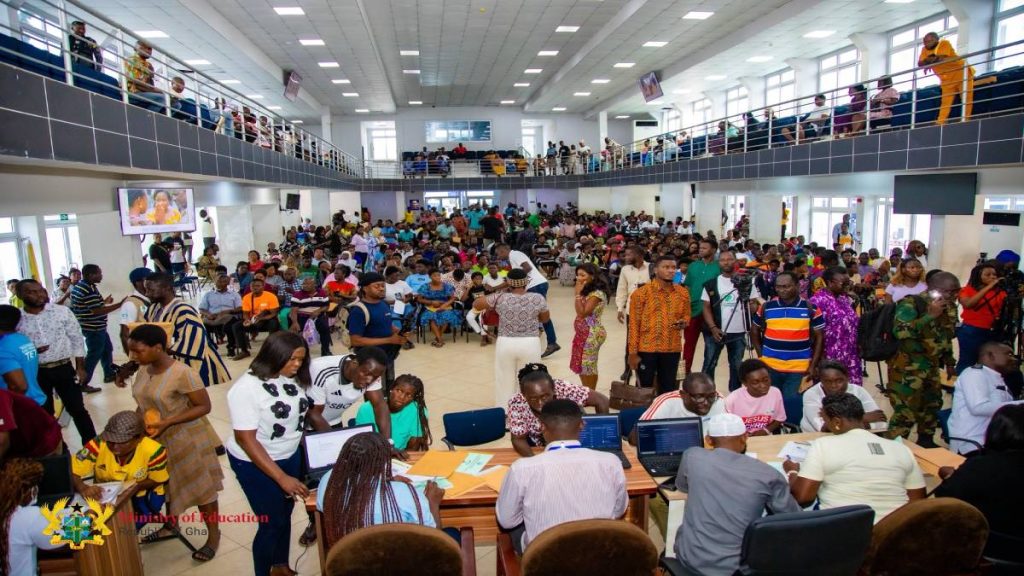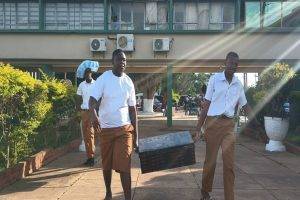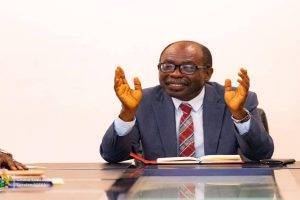MoE Staff urged to explain CSSPS challenges politely to the public

Staff at the Ministry of Education (MoE) have been urged to politely and in a respectful manner explain challenges with the Computerized School Placement to parents of students who sat for this year’s Basic Education Certificate Examination (BECE), who are facing challenges with their school placement process.
“I know you’re dealing with many people besieging the office over school placement issues. Let’s try to explain the situation in a polite and respectful manner,” the Vice President, Professor Jane Naana Opoku-Agyemang, urged.
She added, “What we are trying to do is to create more Category A schools. One of my regrets is that this wasn’t implemented after I left office. We want to build a better system with more top-tier schools.”
In a related development, the Ghana Education Service says a total of 52,492 candidates have so far done self-placement into second-cycle schools under the Computerised School Selection and Placement System (CSSPS).
The Head of Public Relations at GES, Daniel Fenyi, speaking to the Daily Graphic, said the placement resolution centres had received 9,000 complaints, with the Greater Accra centre recording the highest number of 4,000 complaints, with the rest spread across the other regions.
The GES spokesperson said the complaints have largely to do with the change of school, with about 76 per cent of candidates requesting a change from categories ‘B’ and ‘C’ to category ‘A’ second-cycle schools.
“The difficulty is that there are limited spaces in Category ‘A’ schools, which have been filled up. Again, a candidate placed in a particular school cannot be changed except under circumstances of health grounds or relocation,” the Head of Public Relations of the GES, Daniel Fenyi, told the Daily Graphic.
Mr Fenyi indicated that the other major issue had to do with the change of residence from day to boarding, saying residence status was not allowed except in cases of distance, health, or relocation.
“For instance, where a candidate is placed from Wa to Tamale as a day student, we are compelled to change the residence to boarding.
Another issue is no-placement, which is being resolved through self-placement and placement into the private schools,” the Ghana Education Service (GES) Head of Public Relations emphasised.
Mr Fenyi said re-entry candidates, which refers to students who completed basic education in previous years but did not take up the placement opportunity at the time of their completion, would also be placed.
“This comprises qualified candidates from the last three years — 2024, 2023, and 2022 — who could not be placed and want to go to second-cycle schools this year,” the GES spokesman told the Daily Graphic.
“We expect to resolve issues before students report to school. Parents must remain calm and resist paying money to have their issues resolved. Anybody demanding money for placement or changing schools should be reported.
We are committed to addressing all issues and ensuring that our children and younger siblings have a smooth placement into second-cycle schools,” the Public Relations Officer said in the interview.
A total of 590,309 BECE candidates this year qualified for second-cycle school (SHS/TVET) placement. Out of this, 483,800 were placed automatically, while 107,000 secured schools through self-placement.
According to the Ministry of Education, of the 483,800 BECE graduates who secured automatic second-cycle school placement, 234,783, representing 48.6% were boys, and 248,038, representing 51.4% were girls.
It indicated that 82 per cent (82%) of qualified students who sat for the 2025 edition of the Basic Education Certificate Examination (BECE) have been placed in their first-choice second-cycle schools.
This year, a total of 603,328 candidates, comprising 297,250 males and 306,078 females, from nineteen thousand, five hundred and five (19,505) Junior High Schools (JHSs) entered for the school examination.
This includes seventy-two (72 ) candidates with visual impairment, two hundred and thirty-nine (239) with hearing impairment, and one hundred and sixty-one (161) candidates with other test accommodation needs.
The examination was conducted at two thousand, two hundred and thirty-seven (2,237 ) centres across the country. Out of the total number, two thousand, five hundred and twenty-six (2,526) candidates were absent.
The BECE for Private Candidates recorded a total entry figure of one thousand, three hundred and ninety (1,661) candidates. This was made up of eight hundred and fifty-eight (858) males and eight hundred and three (803 ) females.
Fifteen (15) centres, mostly in the regional capitals, were used for the BECE for Private Candidates. Out of the total number of candidates who entered for the examination, fifty-seven (57) were absent.



